#two emotionally stunted man who are deeply traumatized
Text
Fellas is it Identity Theft if you were forced into that body without ever getting a heads up?
#trash of the count's family#cale henituse#tcf novel#tcf manhwa#God of Death fr just yeeted rok soo huh#Not hating on him#its just so fucking funny to me#two emotionally stunted man who are deeply traumatized#exchanged bodies and lives#then fixes each others problems#og!cale with rok soos company overworking him and eventually giving rok soos body a rest and a good life#tcf!cale ending a war and fixing og!cales family life AND ACTUALLY having another good ass family
150 notes
·
View notes
Text
saw a tweet talking about how megumi and gojo's relationship has such little relevance in jjk and now i'm in the trenches thinking about it.
i can understand and see gege opting for either gojo actually raising megumi in order to mirror geto’s twin girls or gojo being a mentor figure who is kind of emotionally distant because he’s a complex person who definitely had a crazy ass upbringing. plus he was a literal teen back then. although, that did not stop geto. however, he probably had a much more emotionally stable upbringing and is less lost in that department. which is a fun dichotomy to have between the two! the mass murder cult soccer mom vs opting to side with humanity distant mentor who is not particularly emotionally nurturing.
that being said. you cannot tell me that gojo cares that much about the next generation. you cannot tell me he gave that much of a shit about riko! about suguru! and then just go 'oh yeah, he doesn't feel shit about megumi'. it doesn’t work!!! he’s a deeply emotional person! stunted and complicated! but he feels deeply. are going to tell me that he doesn’t have any sort of feelings about the kid he took off the streets ten years ago? like?????
i’m not asking for gojo to be a father figure to megumi! (personally find the headcanon really cute but i'm far from dying on that hill! in fact my hill is anything but what is going on in the manga!!!) i’m asking for some sort of something tm! their relationship is an empty canvas! BARREN! it's a complete waste, man.
i mean look at gojo!! look at that psychology class honeypot case and add two traumatized kids to the mix to when he was a literal teenager who also just got mega traumatized! fresh of the star plasma vessel arc! and is already a cesspool of emotional idiocy but who cares deeply!!!!! and you get a very interesting dynamic between him and his charges!
#god i didn't even mention tsumiki. that's another can of worms.#i don't know if it's because gege's speedrunning through the manga or hates gojo but god#man. how about you use the interpersonal relationships to pack a fat emotional kick like you've done before!!!!!!!!#like this is what makes me crazy! he is capable of writing that shit!#jjk
2 notes
·
View notes
Text
i have opinions about The Prince of Egypt musical adaption and you’re going to listen to them: An Essay
So, quick disclaimer: The Prince of Egypt is one of my favourite movies of all time. The casting, the music, the animation, I think it’s one of the top-tier movies that have ever been made. I went into seeing the London West End production of PoE with a full expectation that nothing I saw on stage would ever live up to how much I love the movie. I was fully aware there are plenty of limitations to what can be shown live on a stage with human actors and props.
That being said, I was enormously disappointed with how the whole thing was handled.
The Good
Now before I launch into a whole tirade of what I didn’t like about the production, it does behoove me to say what I think they did do well.
The casting of the role of Moses was done fantastically, as was Miriam, Tzipporah, and Yocheved. The swings and the ensemble were really engaged and well placed, going through lots of quick changes to go from Hebrews to Egyptians to Midianites and back.
The two Egyptian queens, wifes of Seti and Ramses, are actually given names, lines, and character beyond being simply tacked onto their respective kings. We get to see how they feel about the events happening around them, and there’s even a scene where Ramses meets his wife and courts her, whereas in the movie, she stands in the background and says nothing. This is one of the areas I was hoping the musical, which would naturally have a longer run-time, would expand on, and I was pleased to see the opportunity was taken.
Light projections on enormous curtains were used to very good effect, taking us instantly inside the walls of the palace and then out to the desert.
Over all, the work was really put in to be engaging and emotional, and the orchestra really worked to deliver the right musical beats.
One of two stand out scenes as being done very well was the opening “Deliver Us”, which included a bone-chilling moment of Egyptians separating a mother and her baby, with her screams as she’s dragged off-stage, and the blood on the guard’s sword. It really brings home the fear as Yocheved tries to lead Aaron and Miriam to the river with her, not to mention Yocheved’s actress nailed the lullaby.
The second was at the other end of the show, “When You Believe” was beautifully performed by the whole cast, though it was somewhat stunted by what came before...
The Bad
Oh boy.
So the main problem with this show is not the music, not the staging, not even that sometimes the ensemble was a little off-beat (the lai-lai-lai section in Though Heaven’s Eyes comes to mind). Any mistakes there can all be forgiven, since sometimes things just happen in live performance, someone’s a bit off or something’s just not possible to do on the budget allotted.
The problem is in the script.
The Prince of Egypt movie is a story that stands not only on the shoulders of its fantastic music and visuals, but also on its emotive retelling and portrayal of the characters within - mainly Moses and Ramses. And while the stage musical does spend a lot of time with the two mains, it neglects two other, incredibly important characters.
Pharaoh Seti, and God.
In the movie, Seti strikes an intimidating figure. He is old, hardened, and wise in the ways of ruling his kingdom - and is voiced by Patrick Stewart, who brings his A-game to the role. Both Moses and Ramses admire him and look up to him immensely as young men, and the relationship he has with both of them deeply informs their characters as the story progresses. It’s from Seti that Moses learns that taking responsibility for your actions is the respectable thing to do (and later, the true horror of having your idol turn out to be not what you think), and it’s from Seti that Ramses takes a huge inferiority complex.
There are two lines that Seti gets in the movie, one spoken to Moses, and one to Ramses. These two lines define Moses and Ramses’ actions later on in the story:
To Ramses - “One weak link can break the chain of a mighty dynasty!”
To Moses - “Oh my son... they were only slaves.”
Guess which two lines are absent from the musical?
One Weak Link is turned into an upbeat song, rather than shouted at a terrified and cowed young Ramses. Instead of being openly a traumatic, internalised moment of negative character development for Ramses, it’s treated as a general philosophy that Seti passes down to his son. Instead of a judgement that is hung over Ramses’ head like a sword of Damocles, lingering in his mind through the whole story and coming up in a shouted argument with Moses later, it’s said and then moved on from.
The “they were only slaves” comment, on the other hand, is absent entirely. This changes Moses’ relationship with Seti enormously, as well as his relationship with the Hebrew people. Upon finding the mural depicting the killing of the slave children, Moses is appropriately horrified, and Seti shows up to comfort him and defend his terrible actions. Moses leaves this interaction... and then sings about how this is indeed all he ever wanted! He has no moment of horrific realisation that his father thinks of the slaves as lesser, as lives that can be thrown away. This means that the scene where he kills the guard doesn’t lead into a discussion of morality with Ramses as he runs away, but rather Moses breaking down about his heritage as though it’s a negative, instead of something he’s realised is just as valuable as his life as an Egyptian. Instead of Moses being shown as having a strong moral core that protests against the idea of any life being lesser, he bemoans his Hebrew blood loudly, and makes little mention of the man he killed. His issue that causes him to run away is being adopted, rather than his guilt that he’s a murderer, and nothing Ramses can say will change it.
Later on, we don’t see Ramses express this opinion either (in the movie - M:”Seti’s hands bore the blood of thousands of children!” R:“Hah, slaves!” M:“My people!”) so it seems the core reasoning for the necessity of the extremes God had to go to in order to convince Ramses to let the Hebrews go is completely gone.
Which leads us into God Himself, as a character.
God is a tricky topic in general. He is hard to talk about as a concept and as a character, and even harder to depict in a way that won’t offend someone. The Prince of Egypt movie always struck me as a very good depiction of the Old Testament God - vengeful and strong-willed, commanding and yet nurturing, capable of great mercy and great cruelty in one fell swoop. God is incredibly present in the story, a character in and of Himself, speaking with Moses rather than simply commanding him. The conversation at the Burning Bush is bone-chillingly beautiful. Moses is allowed to question, he’s allowed to enquire, he’s allowed to express how he feels about God’s choice, and God is given the chance to respond (and reprimand, and comfort).
In the musical, the Burning Bush scene lasts all of two minutes, during which God (the ensemble cast, acting as one moving flame, speaking in unison) monologues to Moses, and Moses is not given room to question, talk to, or build a relationship with God. Later on, once some of the plagues have gotten underway, Moses rails against God, flinches in his resolve, and tries to back out... and God says nothing. It’s Miriam and the spirit of Yocheved that convince Moses to keep going. As a character, God is nearly absent. Even when it comes to calling upon the Plagues, or parting the Red Sea, God’s voice is absent. Moses does not pray. He does not even use the staff that God encouraged him to pick up as a symbol of his becoming a shepherd of the Hebrews out of Egypt.
It’s these little changes, these little absences of such vital lines and presences, that ends up changing the whole vibe of the show. Seti is more like a dad than an emotionally distant authority figure, and God is more like an emotionally distant authority figure than a character at all. Ultimately, the whole feeling that one is left with at the end…
The Ugly
… is that the script doesn’t like God, or religion in general.
A bold statement to make, considering the source material is one of the central biblical stories in EVERY Abrahamic religion. Moses as a figure is considered so important and close to god, that The Prince of Egypt, even with its sensitive portrayal, cannot be aired in a number of Islamic states, because it’s considered disrespectful to depict any of the prophets, especially an important one like Moses. Moses is arguably the MOST important prophet in the Jewish canon.
However, I haven’t highlighted one of the most noticeable script changes - the elevation of Hotep, the high priest, to main antagonist.
In the original movie, Hotep is a secondary villain, a crony to the Pharaohs, bumbling and snide and two-faced. He and his fellow priest Hoy are there primarily to juxtapose how charlatans can control power through flattery and slight of hand, reassuring Ramses that Moses’ miracles are merely magic the same as what they can do. They even get a whole villain song, “Playing With The Big Boys” which is a lovely deconstruction of lyrics vs visuals, where while the priests boast that their gods and magic are much more powerful, in the background the staff, transformed into a snake by god, devours and defeats the priests’ snake handily. The takeaway from the song is that God’s power is true, and doesn’t need theatrics.
It’s a good little nugget of wordless world building. And it is completely absent from the stage musical, with only a vague reference to the chant of all the gods names.
Hoy is gone, and Hotep is the only priest. He actively speaks out against the Pharaoh, boasts about having all the power, and is played as bombastic and proud. He’s a wildly different character, even threatening Ramses at one point. In the end, it’s shown that Ramses won’t let the Hebrews go not because he has inherited his father Seti’s cruel attitude towards the lives he considers beneath him, but because he is being actively bullied by the priest, and will lose his power and credibility if he doesn’t do as he’s told. Ramses is even given a whole song about how little power he really has. The script desperately wants us to feel sorry for Ramses’ position and hate the unrepentantly, cartoonishly evil priest.
That’s another matter as well - a LOT of time is dedicated to making the Egyptians more human and sympathetic, portraying them as largely ignorant of the suffering beneath them, rather than actively participating in slavery. Characters speak out of turn without regard for formality and class, even to the royal family. They are casual, chummy even. And this would be fine - in fact, it’s good to have that sort of third dimension to characters, even ones who are doing reprehensible things, to show the total normalcy and banality of evil - if it were not for the fact they still include a completely open-and-shut case of evil right next to them.
Hotep has no redeeming features. And on the other side, God is barely present, certainly not in a relatable context. Moses has several lines about how cruel and unnecessary God’s plagues are - and you know what, in this version, they are unnecessary! Ramses is not the stone-hearted ruler that his movie counterpart is, he has no baggage over being a potential failure, because it was never really given to him in the same way! By taking away Ramses’ threatening nature, numbers like the Plagues lose half their appeal, as the back-and-forth ‘you who I called brother’ lines between Moses and Ramses are completely absent. Moses is faithless, and is less torn between the horror of what he’s doing and the necessity of it for the freedom of his people, and more left scrabbling for meaning that he doesn’t find. And the only thing hanging over Ramses is Hotep nit-picking everything he does and threatening him, which is considerably less compelling than the script seems to think it is.
This is best exemplified at the end, when all the issues come to a head. The angel of Death comes and takes the Egyptian first borns (which was actually a well done scene), and the Hebrews leave to a rousing rendition of When You Believe. But then we cut to Ramses and Hotep, with Hotep openly threatening to revolt against the Pharaoh - whom was believed, especially by the priesthood, to be a living god! Hotep is so devoid of redeeming features he cannot even be trusted to stand by his beliefs! - unless Ramses agrees to chase after the Hebrews. Reluctantly, Ramses is badgered into the attempt.
Back with the Hebrews, Moses parts the Red Sea… not with his faith, not by praying to God for another miracle, not even by using his staff as in the most famous scene of the movie… but by holding out his hand and demanding the ‘magic’ work. Setting aside the disrespect of Abrahamic religions to call one of the most famous miracles “magic” (and my oh my, if there was a fundamentalist of any religion in the audience they might have gasped to hear it), it again belittles the work of God, and puts all the onus on Moses, not as a conduit for God’s work, but as the worker himself. Then, the Egyptians arrive in pursuit, lead by Hotep, not Ramses. Moses sends the Hebrews through first, lead by Miriam, and stays behind with Tzipporah… to offer his life in penance to Ramses! The script has completely stripped both Ramses and Moses of their convictions towards their causes, and Moses cannot even stand by his decision to lead his people.
Then, in a moment of jarring melodrama, Moses has a sudden vision that Ramses, his brother, will one day be called Ramses the Great (an actual historical Pharaoh who reigned 1279-1213 BCE). There is no historical evidence that this was the Ramses that ruled over the Hebrews (there are 11 Pharaohs called Ramses through the history of Ancient Egypt), and maybe if the scene was acted a little better, it wouldn’t have been so sudden or jarring. Even more jarring, is that then Hotep arrives with the rest of the army, and Ramses refuses to lead the charge into the parted sea. Hotep does so himself, and is the one to have the final dramatic moment, being crushed under the water.
The Takeaway
After watching the show, I’m afraid I could never recommend it as either a play, an adaption, or even as a faithful retelling of a bible story. Its character drama isn’t compelling enough to be good as a standalone play, with it two main characters declawed and their core motivations reduced to a squabble between brothers rather than a grand interplay between two cultures and ideas and trauma handed down from their father. As an adaption of the movie it’s upsettingly bad, with grand numbers like the Plagues rendered piecemeal and fan favourites like Playing With The Big Boys missing entirely. As a retelling of the bible story, it’s insulting, completely cutting God out of the equation, taking no opportunity to reintroduce Aaron as an important character (which he was, in the bible, as Moses was a notoriously bad public speaker, with a stutter, and Aaron often interpreted for him) and more importantly, completely erasing God’s influence from the narrative.
I don’t know who this show was… for, in that case. If it wasn’t for drama lovers, movie fans, or people of the faith, then who the hell was it for? Why change such a critically acclaimed and well-beloved story? Why take away all these defining moments? If you wanted to tell a story about how religion is the true evil, how God can command people to do terrible things, and how those who uphold organised religion like Hotep are unrepentant, one-dimensional monsters… why would you tell that through the Prince of Egypt?
Underwhelming at best, infuriating at worst… just watch the movie. Or read Exodus. At least the Bible’s free.
67 notes
·
View notes
Photo

Trust (1990)
Directed by Hal Hartley
Doomsy’s Rating: 100/100 (My favorite film!)
Is Trust the best film ever made from a technical point of view? No. Is it my favorite film of all time? Hell yes it is. At this point, I think I’ve seen this classic going on fifty times and every time it’s just perfect and everything I could ever want in a film.
Before you read any further, I implore you if you’ve never heard of this film (understandable if you haven’t, it’s somewhat obscure), stop what you’re doing and make the effort to find it.
Trust, for lack of a better word, invented emo culture.
It didn’t popularize it—the film was little seen at the time of its release outside arthouse crowds and fans of the director—but it created the first modern emo protagonist way back in 1989 with the wonderfully unpredictable icon and quote machine Matthew Slaughter, seen below in all his jet-black, chain-smoking laconism:
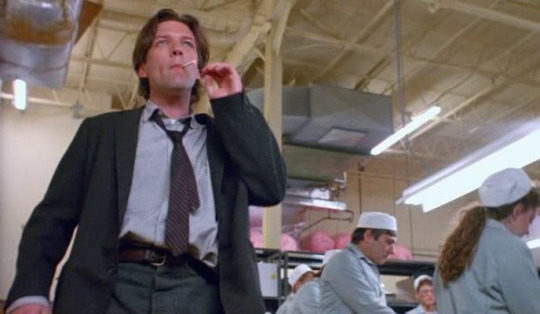
Matthew Slaughter may be, in my humble opinion, one of the top five greatest cinema characters ever. Martin Donovan, who has to date, appeared in nine of director Hal Hartley’s films, brings this troubled, intellectual, confrontation-prone yet empathetic soul to life in a layered performance of gruff scowl and poetic wisdom. If Holden Caulfield’s internal musings of apathy were the skeleton, Matthew Slaughter is the muscular exterior, throwing glances of possession and clouds of smoke to whoever dares to question his integrity. His permanently clenched fists and avoidance of eye contact belie the traumatic home life that in another film would be presented as more serious. Here, instead of regarding parental abuse with the utmost sincerity, Matthew’s obsessive-compulsive, violent father (played with disturbing teeth-gnashing verve by John MacKay) is shown as a near caricature, literally exploding into his son’s room with nefarious intentions, the door being cartoonishly thrown off its hinges like some Looney Tunes gag. But Matthew’s father is no joke. His gaslighting and nasty streak are instantly relatable, evoking no laughs just as Hartley surely intended. Matthew’s half of the film is sad and lonely, but insightful and warm in a way that only a humanist at heart could affect. His deadpan aphorisms are endlessly quotable and influenced many romantic depressives for decades to come, including Jim Carrey’s Joel in Eternal Sunshine of the Spotless Mind, Donnie Darko’s title character, the protagonist of Submarine, and so forth. But alas, Trust is a film of two protagonists and their aimless lives on Long Island and their hope in each other. So, more on Matthew a little later on.

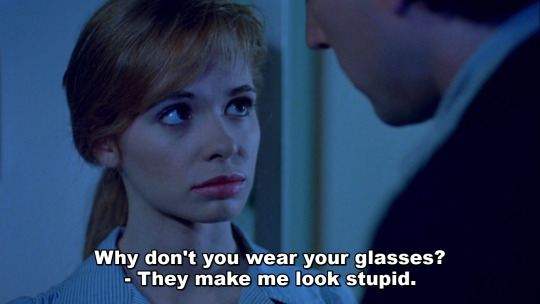
Trust’s other half is dominated by the luminous, adorable Adrienne Shelly in her greatest role, as Maria, a quick-witted and carefree 17-year-old girl grappling with an unplanned pregnancy at the hands of her pathetic quarterback boyfriend Anthony, and suddenly being cast adrift in a cruel and unforgiving town of sexual predators, toxic masculinity, and unstable homes. She begins the film an archetypal nubile, but through her interactions and ultimate romantic relationship with the older and likely asexual Matthew, she learns to believe in someone other than herself and to find her place and confidence. Adrienne Shelly, the beautiful, effervescent soul that was sadly murdered a mere fifteen years later, is a beaming ray of light no matter what room she enters.
Maria, as a pregnant teen struggling to find a path and possessing an acerbic tongue and a penchant for leaving accidental disaster in her wake, precedes Juno by nearly two decades and again, has clearly influenced emo culture with her hilariously dorky glasses (seen below) and sunken, eyeliner heavy aesthetic. She begins the film by unintentionally slapping her father into a heart attack-induced untimely demise, then spends the rest of her narrative attempting to make amends with her psychopathic mother (a fantastic Merritt Nelson) and make up her mind over whether to keep her child, played out in a highly-stylized manner that some would compare to the works of David Lynch (namely the domestic areas of Twin Peaks) but more closely aligns with the literary approach of Salinger or the Bronte sisters.
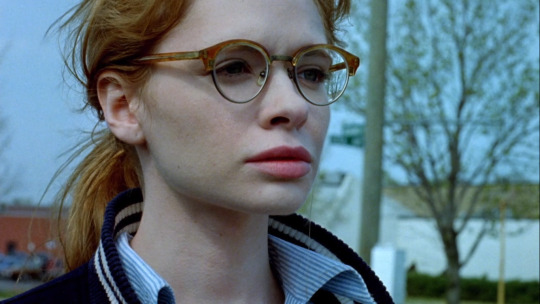
One thing that Trust managed to do, before perhaps any other piece of media at that time, was show how the alienation of youth from the commercialism of the 1980s was already blooming, and it captured, before grunge took it mainstream, the depressing lack of direction experienced by outsiders who couldn’t fit into Reagan’s model. Matthew and Maria do not fit in to the respective lives: Matthew is a thirty-year-old genius still living with a father who hates him, and despite his gifts, has sustained a failure to launch; Maria is a pregnant high school dropout with nothing on her mind besides what’s ten feet in front of her. These two, forced to rely on lethal safety nets, meet by pure happenstance on a cold night in a ramshackle building, and share four or five honest lines and a connection is forged.Their attempts to bring the other into their respective abusive homes are met with consternation and further verbal and physical altercations, almost all of which are darkly humorous in some way, but never successful. And yet, their initial desires to become responsible members of society only decay their psyches more. It is here that we realize while they may not get a happy ending, they have retained their independent identities and succeeded at what they set out to do.
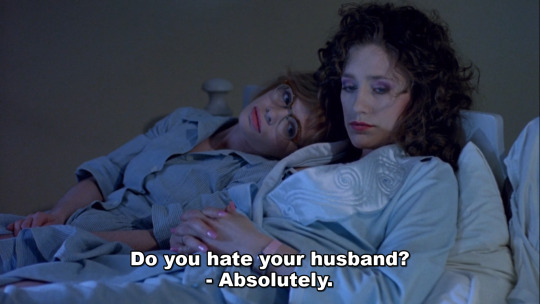
The best scene in the film comes about halfway through, where Matthew comes into a bar, casually punches two people, then sits down with a massive “keep out” sign practically stapled to his forehead when he’s approached by Peg, Maria’s older, divorced sister. The dialogue of this scene, some of the best I’ve ever seen, somehow pales in comparison to the perfectly-tuned chemistry between the sexy, sassy Peg and the nihilistic Matthew, both of them playing off the other’s perceived weaknesses like the screwball comedies of old. The scene climaxes in a poisonous barb that leaves Peg speechless, and is the only time in entire film when Matthew utilizes a lowbrow dialectic.

It’s also one of the few instances in the entire film when Matthew looks at a character other than Maria while addressing them, leading me to believe (among other reasons) that he’s somewhere on the autism spectrum. His extreme difficulty in opening up to others is shown in painstaking detail, as is his extreme intelligence and lack of upward momentum. Whenever someone or something threatens his world and paradigms, he will often react violently or impulsively. This is a man who carries around a handgrenade “just in case.” He is terrified of change, but he is also aware of the fact that life is always changing. Sometimes quickly, perhaps even painfully, but it does.
The strange thing is that, even by the film’s end, despite his best efforts, Matthew’s changes as a character are minute. His growth, while not stunted per se, is reliant on whether he is understood, and even Maria, his soul mate, doesn’t get him sometimes. Relationships with a partner on the autism spectrum can be tricky (speaking from experience) but are so worthwhile because they are not unsure of who they are or what they want. Matthew spends much of his dialogue speaking his mind, at times perhaps even too direct (as above) but he is a singular and thoughtful person who wants to do right by the world, even when he doesn’t agree with it.
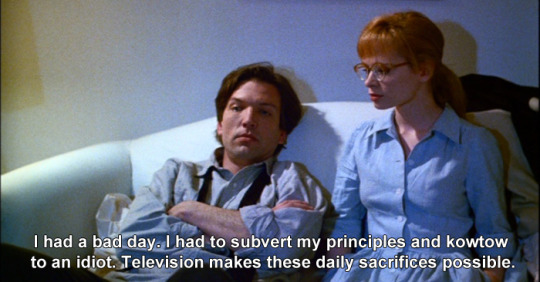
As the film progresses and Maria’s arc of the film takes precedence, the film shifts direction slightly into a powerfully feminist and deeply open-minded look at a woman’s right to choice, both in her life direction, and more bluntly, about abortion issues. A wonderful subplot involving a no-nonsense nurse (Karen Sillas) that nonchalantly offers her teenage abortion patients shots of scotch in celebration is both hysterical and sad, running the gamut of emotions with a tone of ambivalence. It is the flat prosody of the film that makes all these individual elements come to life, from top down.
Overall, Trust is a film without Hollywood glitz, but just as achingly romantic and heartfelt and emotionally fulfilling as the silver screen can provide, and most postmodern romantics and emo culture wouldn’t exist without its influence. It’s as honest, sincere and a real as movies get.
Please, everyone just watch this. It would be Tumblr’s favorite movie, just like it is mine.
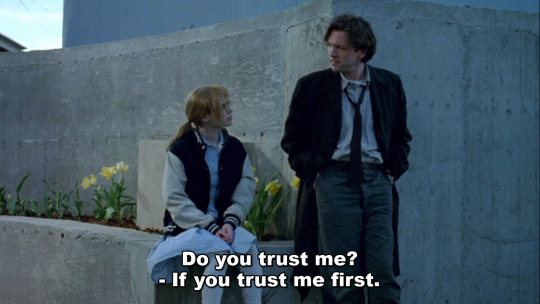
#film#filmreview#great movie#trust#emo#goth#postmodern#romance#hal hartley#martin donovan#adrienne shelly#matthew slaughter#filmblr#movies#cinema#romantic comedy#nihilism#cute#feminism#independent film#drama#1990#long island#edie falco#merritt nelson#emo culture#goth culture#post-punk#emo movie#emo romance
38 notes
·
View notes
Note
I saw your tags about wanting a redemption arc for Cersei, and while I haven't gotten though the books yet, I really do too! Seems like men get redemption arcs no matter how horrible they were but with women it's like “oh no, she’s evil! She can’t be saved! Guess we should kill her bc there’s clearly no other way.” Cersei is already hard to hate so a redemption arc would be so awesome but from what little I do know, sounds like she’s already doomed :(
Oh, I understand exactly how you feel. Cersei is such a well-written villain; in the hands of the wrong author, she could feel completely two-dimensional and cartoonish, but GRRM really does to a great job of making her over-the-top and yet still realistic and even somewhat relatable.
That over-the-top aspect is honestly why I think it would be so amazing and groundbreaking to see Cersei have a redemption arc. Even female villains who are much more like anti-heroes than Cersei’s obvious and unquestionable villainy have often been killed without a chance to redeem themselves, because of course if a woman ever stops being morally pure, she’ll always be that way, no chance of redemption. It definitely is a double standard.
Take Darth Vader, for example (who I love, don’t get me wrong). This man is a mass murderer. He’s literally killed entire planets of people and has been unnecessarily cruel. His violence is much more than just what is necessary; he takes active enjoyment in crushing others. And yet we all cried during his death anyway. We all accepted that he was totally, irrevocably redeemed (which he was, but I seriously doubt that anyone thought twice about it). Like...what about the children he slaughtered? What about all the innocents he killed? Because he loved his son and gave his life to save him, we all just accepted that he had been totally redeemed. (And again, he was totally redeemed. I’m just pointing out that no one ever questioned it - not to my knowledge, anyway). Because men always have the light™ inside them, I guess. Despite Darth Vader’s two-decade-long crusade of mass murder, torture, brutality, much of which was unnecessary, he still had goodness inside him, Luke brought that goodness out, and we all accepted it. Even someone who committed such atrocious acts never truly lost that last bit of light inside him.
Men can fall, and they can be redeemed, no matter how low they sink (like I said in Vader’s example, mass murder). But women? If they even start down the path of villainy, they can’t be saved. She’s lost her moral compass and she’ll never get it back.
And that’s why, if Cersei was redeemed, it would be so groundbreaking. Cersei is so cruel, so emotionally stunted, so vicious, so selfish, and to see a female character like her be redeemed would honestly be beautiful to me. I’m not saying she has to end up happy, I’m not even saying she has to live, but some form of redemption for her, in my opinion, would push back massively against the internalized sexism that a woman who’s a villain can never “come back”.
And as @eldritch-crone once pointed out, I think it’s very telling about this fandom’s sexism to see that so few people consider the possibility of Cersei being redeemed. Cersei has still been a victim of the men in her life, and she’s intensely, thoroughly, and deeply traumatized. She’s been through a lot of emotional pain, and male villains who have been through emotional pain get redemption in several instances. So I ask: why not Cersei? Why can’t she be redeemed? Why do we consider this so utterly impossible?
Frankly, I think GRRM is part of the problem too. From the way he writes Cersei, it’s clear he has no intention of redeeming her. She’s a villain, and she’ll die a villain. She’s introduced in her POV as paranoid, hungry for power, intensely self-centered, and completely lacking any self-awareness, which is a key quality for redemption. If GRRM had any thoughts of giving her a redemption arc, I highly doubt he would keep these qualities so consistent and unchanging in her chapters.
It’s unfortunate, really. I would love to see Cersei get a redemption arc, but it’s clearly not going to happen. And, sadly, it’s clear that she won’t make it through the series alive, likely strangled to death by the man who once had her absolute trust (no matter how unhealthy their relationship is).
126 notes
·
View notes